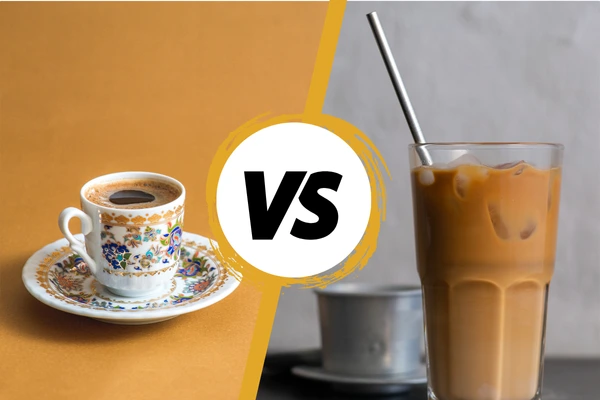Turkish Coffee vs Vietnamese Coffee is a matchup between two brewing traditions that couldn’t be more different. One is unfiltered, foamy, and ritualistic, the other is slow-dripped, creamy, and indulgent. Both are bold in their own way, but they deliver entirely different drinking experiences.
Turkish Coffee vs Vietnamese Coffee – Preparation Differences
The main difference in brewing method between these two coffees is that Turkish coffee is simmered unfiltered in a small pot, while Vietnamese coffee is slow-dripped through a metal filter.
Turkish coffee is prepared in a cezve, a smal,l long-handled pot usually made of copper or brass. The coffee is ground to an ultra-fine powder and mixed with water directly in the cezve.
Sugar is often added at this stage rather than afterward. The mixture is heated slowly until it foams, but it must never be brought to a rolling boil.
The coffee is never filtered, which gives it that thick body and a layer of fine sediment at the bottom of the cup.
Vietnamese coffee is brewed with a phin, a small metal drip filter that sits on top of the cup. Medium-to-coarse ground coffee is placed inside, hot water is poured over, and the brew drips slowly into the cup below.
It can take several minutes for the dripping to finish. In most cases, the coffee drips directly over a layer of sweetened condensed milk. Once the brew is ready, it is stirred to create a rich, sweet balance of bold coffee and creamy milk.
What Is the Difference in Flavor and Taste?
The key difference is that Turkish coffee is prepared with Arabica beans, while Vietnamese coffee is prepared with Robusta beans.
Turkish coffee is strong, thick, and sometimes spiced, while Vietnamese coffee is bold yet smooth, usually sweetened with condensed milk.
For Turkish coffee, the ultra-fine grounds give it a thick, almost muddy texture that coats the palate. Its flavor is bold, slightly bitter, and can lean earthy depending on the beans. Many people add cardamom, which brings a warm and aromatic layer.
Vietnamese coffee can be robust and slightly smoky, but once mixed with condensed milk, it transforms into a creamy, dessert-like drink. The sweetness balances the bitterness beautifully, making it far smoother than plain Robusta beans can be.
You may be curious: Why Turkish coffee is different from other coffee.
Is Vietnamese Coffee Stronger Than Turkish Coffee?
Yes, Vietnamese coffee is generally stronger than Turkish coffee when it comes to caffeine content, and the reason lies in the beans.
Turkish coffee is always made with Arabica beans. Arabica has a smoother flavor profile with lower caffeine levels.
Vietnamese coffee is most often brewed with robusta beans, which naturally contain nearly twice the caffeine of Arabica. Combined with the slow drip method of the phin filter, you end up with a brew that packs a serious jolt of energy.
You may be interested in our comparison of Bosnian coffee vs Turkish coffee to see if those two brews are different, even if they’re so related.
FAQ
Which coffee is better for people who like strong flavors?
If you want pure, concentrated strength, Turkish coffee is the winner. Vietnamese coffee is also strong, but once mixed with condensed milk, it becomes sweeter and creamier.
Is Turkish coffee always served with sugar?
Not always. Sugar is added during brewing, not after, so you decide upfront how sweet you want it.
What makes Vietnamese coffee so sweet?
The signature sweetness comes from condensed milk. It’s thick, creamy, and loaded with sugar, which balances the naturally strong and sometimes bitter robusta beans.
Can you make Turkish coffee without a cezve?
Yes, you can. While a cezve gives the most authentic results, there are workarounds. If you want to explore your options, check out our full guide on the best ways to make Turkish coffee without a cezve.
Key Takeaways on Turkish Coffee vs Vietnamese Coffee
Two legendary coffee traditions, two very different experiences.
- Turkish coffee is brewed unfiltered in a cezve, creating a thick, concentrated cup with bold flavor and fine grounds at the bottom.
- Vietnamese coffee is slow-dripped through a phin and often paired with condensed milk for a rich, sweet, and creamy balance.
- Turkish coffee usually relies on Arabica beans, which means lower caffeine but a smoother taste.
- Vietnamese coffee leans on robusta beans, giving it nearly double the caffeine and a stronger kick.
- Turkish coffee appeals to those who love pure intensity, while Vietnamese coffee satisfies anyone who wants both strength and indulgence.

